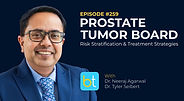BackTable / Urology / Podcast / Episode #53
Radiation Therapy for Favorable Intermediate Risk Prostate Cancer
with Dr. Amar Kishan
In this episode of BackTable Urology, Dr. Aditya Bagrodia discusses radiation therapy for favorable intermediate-risk prostate cancer with radiation oncologist Dr. Amar Kishan, Chief of the Genitourinary Oncology Service for the Department of Radiation Oncology at UCLA.
This podcast is supported by:
Be part of the conversation. Put your sponsored messaging on this episode. Learn how.

BackTable, LLC (Producer). (2022, September 7). Ep. 53 – Radiation Therapy for Favorable Intermediate Risk Prostate Cancer [Audio podcast]. Retrieved from https://www.backtable.com
Stay Up To Date
Follow:
Subscribe:
Sign Up:
Podcast Contributors
Synopsis
First, the doctors discuss important patient factors to consider when designing a radiation therapy regime. Dr. Kishan emphasizes the importance of considering the patient’s baseline characteristics and preferences. Because favorable intermediate-risk prostate cancer is curable, his top priority is optimizing post-operative quality of life in areas such as urinary function, bowel function, and sexual function. In order to measure baseline characteristics, he uses various questionnaires, such as the IPSS questionnaire and the SHIM score. Additionally, he takes a thorough patient history in order to screen for any contraindications for radiation, such as a history of pelvic radiation, active inflammatory bowel disease, radiosensitivity syndromes, and lower urinary tract symptoms (LUTS). He mentions that TURP and HoLEP procedures are not contraindications for radiation therapy, but recommends waiting 12 weeks after the operation to start radiation because of the risk of hematuria. He also recommends MRI for imaging.
Additionally, he discusses the option of combining radiation therapy with adjuvant androgen deprivation therapy (ADT). Because the likelihood of curing favorable intermediate-risk prostate cancer with radiation monotherapy is high (90% over 7-10 years), ADT is often not required. However, he considers ADT if the Gleason score and volume of disease point to a more aggressive prostate cancer. He also uses the Decipher test, a molecular test that helps him decide whether or not to include ADT in a patient’s treatment regime. Dr. Kishan notes that de-intensifying conventional therapy must be based on evidence and towards a goal of reducing the absolute risk of the patient.
Dr. Kishan also explains the different radiation therapy options. There are two main categories: external beam radiation and brachytherapy (internal radiation). External beam radiation delivers an X-ray dose daily. The conventional timeline is 9 weeks of therapy but a shorter 5-day SBRT course can be used. Brachytherapy is a surgical procedure in which the surgeon places radioactive pellets inside the prostate. The pellets are left inside the patient in low-dose brachytherapy, while they are removed after 15-20 minutes in high-dose brachytherapy. Dr. Kishan believes that an extra boost of brachytherapy is not required and can in fact introduce more toxicities. Contraindications to brachytherapy include bleeding risks, anesthesia risks, larger prostates (large median lobe), and pubic arch interference. For external beam radiation, spacers for patients with rectal problems and fiducial markers may help with narrowing margins needed for treatment, since the prostate is a mobile organ.
Finally, Dr. Bagrodia and Dr. Kishan delve into a discussion about recent radiation therapy trials and briefly discuss the field of radiogenomics, an area that is developing DNA screening tests to predict idiosyncratic reactions to radiation therapy.
The Materials available on BackTable are provided for informational and educational purposes only and are not a substitute for the independent professional judgment of a qualified healthcare professional in diagnosing or treating patients. Any opinions, statements, or views expressed are those of the individual contributors and do not necessarily reflect those of the publisher, platform, or any affiliated organization.











